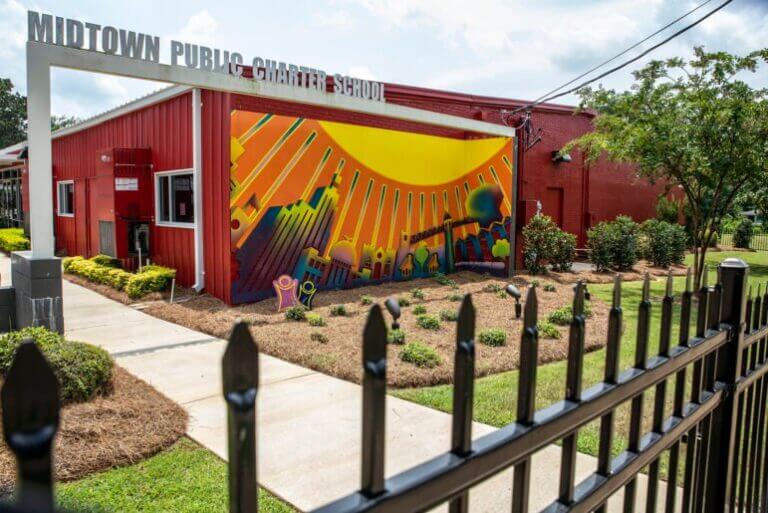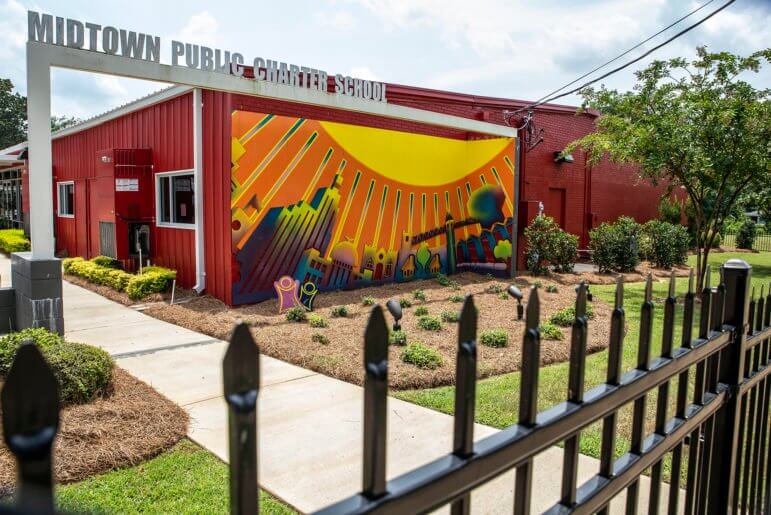

Eric J. Shelton, Mississippi Today/ Report for America
Midtown Public Charter School is seen in the 300 block of Adelle Street in Jackson Monday, July 30, 2018. Midtown Public received an F accountability rating in 2016 and 2017.
A legislative watchdog committee is questioning why the board overseeing charter schools in Mississippi renewed the contract of an underperforming school in Jackson earlier this year.
In April, the Mississippi Charter School Authorizer Board issued a three-year renewal contract to Midtown Public Charter School in Jackson — despite the fact the school has not exceeded a ‘D’ rating since it first opened in 2015.
Charter schools in Mississippi must meet certain goals to continue to operate and are considered for renewal every five years, according to state law.
In its report, the Performance Evaluation and Expenditure Review (PEER) committee cited an evaluation of Mississippi’s charter school performance measures done by the National Association of Charter School Authorizers earlier this year.
“MCSAB’s (charter school) renewal policies … weaken the rigor of the renewal process. For example, an underperforming school may be renewed based solely on one year of performance without consideration of earlier years of critically low performance,” stated the report. “MCSAB granted renewal to Midtown Public although it did not meet the terms of the performance framework. Further, MCSAB’s conditions of renewal are not rigorous and rely on expectations of future improvement.”
“Performance framework” refers to the accountability mechanism for charter schools in the state. It is made up of several components, including markers of a school’s academic, financial and organizational performance.
Lisa Karmacharya, executive director of the authorizer board, said the short answer is that the board was following the recommendations of both internal and external evaluators when it made the decision.
The conditions of Midtown’s renewal include that the school must: establish performance targets with the board; be rated a “D” or higher in 2021, and a “C” or higher in both 2022 and 2023; and enroll the number of underserved students in accordance with state law. It also must “restructure its governance plan to ensure all board members are knowledgeable” of the contract between the board and the school and must align its future fiscal plan to improving student outcomes.
“I think we are moving along really well, all things considered with COVID-19,” said Karmacharya of the progress being made by Midtown, noting the school and board have established performance targets and Midtown is now serving above the required percentage of underserved students.
“We can see they are making progress,” she said.
The PEER report also noted that while the board has improved its oversight of a federal grant designed to help states open more charter schools, it continues to be “significantly behind” in its projected grant expenditures at this point. It has spent only 12% of the $15 million in funds at the time of the report, despite the board’s expectation to have spent nearly half of its funds by this time.
Karmacharya, who stepped into the role of executive director in the beginning of 2019, said because the board had no executive director for around nine months, no claims were being submitted to the board by the charter schools receiving some of the funds.
In addition, only six charter schools are currently in operation, and a relatively small number of operators have applied to open schools in recent years.
“The first drawdown from that $15 million grant wasn’t until 2019,” she said. “And with respect to an overall lower number of (charter school operator) applicants has resulted in fewer approvals (of charter schools) which impacts the number of subgrant recipients.”
The 2019 version of the PEER report highlighted the same issue. In its response, the board noted there are no restrictions on carrying over funds from year to year and it would be requesting a no-cost extension in the fifth year of the grant.
The PEER committee also highlighted an inequitable share of local per-pupil funding between traditional public and charter schools, with charter schools receiving more.
“In the case of JPSD (Jackson Public School District) for school year 2019-2020, charter schools operating within the district received a per pupil local ad valorem amount of $3,011.84 while JPSD received a perp pupil local ad valorem amount of $2,774.12, a difference of $237.72 per pupil.”
Public charter schools in Mississippi are funded by the state on a per-pupil basis according to the school’s average daily attendance, or the number of students who attend 63 percent or more of a school day. They also receive local dollars from ad valorem tax receipts. When a student enrolls in a charter school, money that would have gone to the public school district moves with the student to the charter school.
As a result, the committee recommended that the board and the Mississippi Department of Education should submit a proposed amendment to state law in order to ensure local ad valorem funding is equal among students.
The Mississippi Legislature passed its charter school law in 2013. During the 2019 school year, six charter schools — five in Jackson and one in Clarksdale — served a total over 1,992 students.
The post Report questions why underperforming charter school was renewed appeared first on Mississippi Today.
- In trial of ex-wrestler, Mississippi’s former welfare director testifies about appeasing politicians, trying ‘my very best’ - February 23, 2026
- It’s early, yes, but Mississippi’s college baseball teams have started fast - February 23, 2026
- Mississippi House wants to increase public school oversight - February 23, 2026